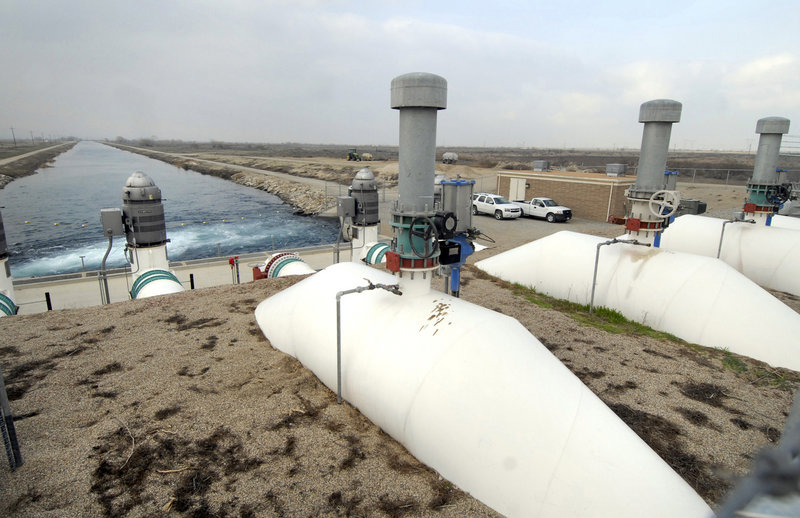FRESNO, Calif. — They grew their fortune in the California sun, turning pedestrian fruits and nuts into a vast and varied empire that secured their place in Hollywood.
Stewart and Lynda Resnick’s flashy bottles of Fiji Water and POM Wonderful are now coveted across the globe. Their donations keep the lights on in museums across the country. And Gov. Arnold Schwarzenegger and Arianna Huffington count them among their dearest friends. But as their marketshare rises worldwide, one of the billionaires’ competitors is fighting back, accusing the Western power couple of profiting at the public’s expense, court records and interviews show.
Now, as drought-stricken California weighs whether to give private companies more control in managing its scarce water supplies, a new lawsuit claiming the Resnicks violated utilities law by making money from a vast, taxpayer-funded underground reservoir is causing a stir in the state Capitol.
“Water is a public resource, owned by the people,” said Democratic Assemblyman Jared Huffman of San Rafael. “We shouldn’t be giving away public funds to private sector interests, let alone choosing winners and losers in the business world.”
The Resnicks, who live in a Beverly Hills mansion and have a second home in Aspen, Colo., are among the nation’s largest corporate farmers and are generous philanthropists and political donors, giving $536,000 to Democratic and Republican California governors in the last decade.
The Los Angeles Business Journal estimates the couple’s empire is worth $1.5 billion. It includes about 120,000 acres in California’s Central Valley — where they say they own more fresh citrus, almond and pistachio trees than anyone else in the country — and a facility akin to the Fort Knox of water.
That kind of success, Lynda Resnick said, can inspire jealousy, and likely motivated this most recent “nuisance” lawsuit. Her husband declined to be interviewed.
After growing up working class in Highland Park, N.J., Stewart Resnick started a business waxing floors while in law school at the University of California, Los Angeles. The couple bought farmland in the 1980s as a hedge against inflation, gaining access to water contracts attached to those parcels.
EARLY INVESTMENT PAYS OFF
As drought has hammered the region, leading farmers to abandon their dry fields, the Resnicks’ 48 percent stake in the Kern Water Bank, an underground pool that stores billions of gallons of freshwater, has become increasingly valuable.
Court records show that in 2007, the Resnicks’ companies’ combined water holdings reached 755,868 acre feet — more than twice the size of San Francisco’s Hetch Hetchy reservoir. In 2007, that volume would have qualified as California’s 11th largest reservoir, but the firms’ water holdings have diminished since, company officials said.
That cache provided enough to nourish the Resnicks’ orchards, but it also offered another benefit. From 2000 to 2007, records show the state paid the Resnicks an additional $30.6 million for water previously stored there as part of a program to protect fish native to the ecologically fragile Sacramento-San Joaquin Delta.
Ali Amin, a Persian immigrant who owns a competing pistachio processing plant, filed a lawsuit in late March in Fresno County Superior Court claiming the Resnicks violated California public utilities laws because they turned a profit by selling water to farmers who weren’t members of their Bakersfield-based water company, Westside Mutual Water Co.
“You feel like David fighting Goliath,” Amin said. “If they’re allowed to keep doing this, the rest of the independents and small growers won’t be able to compete.”
Amin’s lawsuit alleges he lost $22 million in revenue when growers lured by water supplies sold their nuts to the Resnicks’ plant, which processes almost two-thirds of the nation’s pistachios. Amin controls about 5 percent of the market.
Resnick and other water users in agricultural Kern County gained control of the Kern bank — the largest underground water storage facility in the nation — in the mid 1990s, following a round of negotiations with the state Department of Water Resources. Their position was that the state had shorted rural areas in allotting water in a previous drought.
To avoid potential litigation from unhappy water users, state officials ceded ownership of the Kern Water Bank — developed with $74 million from the department and $23 million in taxpayer-approved bonds — to a local water agency. In return, water users gave back 45,000 acre feet from the amount they contracted to receive each year.
The deal was a pivotal moment in the rise of the Resnicks’ business interests. Ownership of the bank was transferred to a joint powers authority including the local water agency, the Resnicks’ Westside Mutual Water Co. and four water districts.
Westside distributes water stored there to its members, the operations that grow the Resnicks’ fruits and nuts, according to court records.
PUBLIC ASSET, PRIVATE CONTROL
To prevent price-gouging, the California Public Utilities Commission requires most mutual water companies to register as public utilities and subject their rates to state regulation if they sell water to nonmembers for profit. There are some exceptions, such as a “water emergency,” but the PUC rules require those sales to nonmembers to be at cost.
PUC staff attorney Fred Harris said Westside had not registered with the PUC. If the company skirted the law, by selling water to nonmembers at a profit — as the Amin suit alleges — Harris said Westside could be required to register and set up rates with the commission.
Assemblyman Huffman and Sen. Dean Florez, D-Shafter, said those allegations in the Amin lawsuit touch on a broader debate about whether companies should be able to profit from taxpayer-funded waterworks amid a drought.
An $11.1 billion water bond signed last year by Schwarzenegger would allow private companies to partially own, operate and profit from dams, reservoirs and water banks built with billions in public funds. It won’t become law unless voters approve it on the November ballot, and it’s unclear how the bond proposal would interact with current laws on public-private partnerships.
“I don’t think anyone wants to see this become a gift of public funds to private corporations,” said Huffman, who is considering introducing a bond amendment to remove or clarify the language.
Copy the Story Link
Send questions/comments to the editors.





Success. Please wait for the page to reload. If the page does not reload within 5 seconds, please refresh the page.
Enter your email and password to access comments.
Hi, to comment on stories you must . This profile is in addition to your subscription and website login.
Already have a commenting profile? .
Invalid username/password.
Please check your email to confirm and complete your registration.
Only subscribers are eligible to post comments. Please subscribe or login first for digital access. Here’s why.
Use the form below to reset your password. When you've submitted your account email, we will send an email with a reset code.